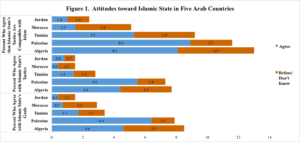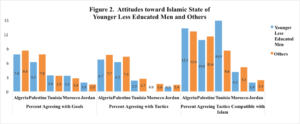Support for the Islamic State in the Arab World
Post developed by Catherine Allen-West in coordination with Michael Robbins.
ICYMI (In Case You Missed It), the following work was presented at the 2016 Annual Meeting of the American Political Science Association (APSA). The presentation, titled “Passive Support for the Islamic State: Evidence from a Survey Experiment” was a part of the session “Survey and Laboratory Experiments in the Middle East and North Africa” on Thursday, September 1, 2016.
On Thursday morning at APSA 2016, Michael Robbins, Amaney Jamal and Mark Tessler presented work which explores levels of support for the Islamic State among Arabs, using new data from the Arab Barometer. The slide set used in their presentation can be viewed here: slides from Robbins/Jamal/Tessler presentation
Their results show that among the five Arab countries studied (Jordan, Morocco, Tunisia, Palestine and Algeria) there is very little support for the tactics used by Islamic State.

Furthermore, even among Islamic State’s key demographic – younger, less-educated males – support remains low.

For a more elaborate discussion of this work and the above figures, please see their recent post in the Washington Post’s Monkey Cage blog, “What do ordinary citizens in the Arab world really think about the Islamic State?”
Mark Tessler is the Samuel J. Eldersveld Collegiate Professor of Political Science at the University of Michigan. Michael Robbins is the director of the Arab Barometer. Amaney A. Jamal is the Edwards S. Sanford Professor of Politics at Princeton University and director of the Mamdouha S. Bobst Center for Peace and Justice.

